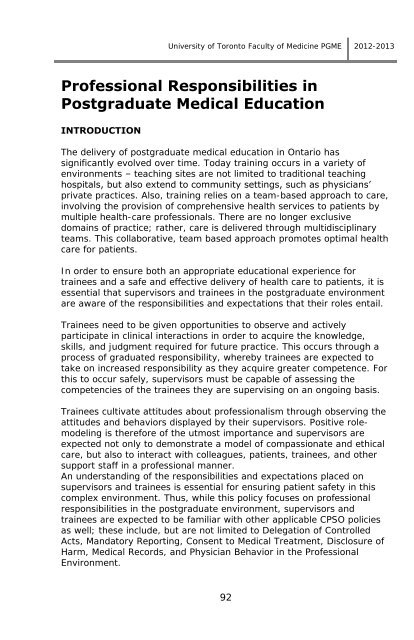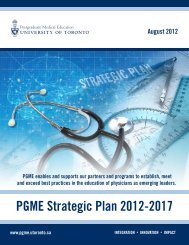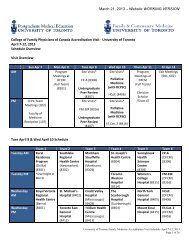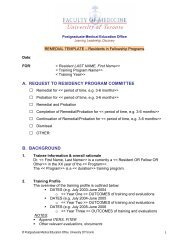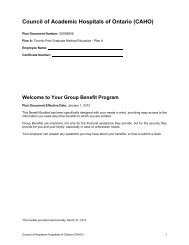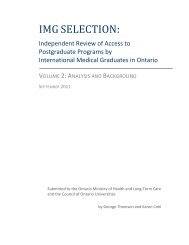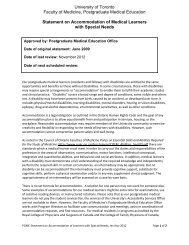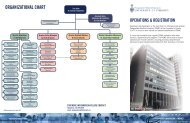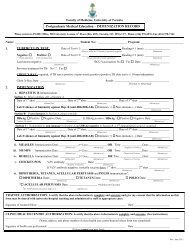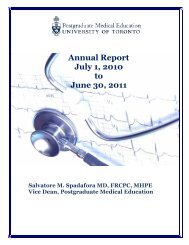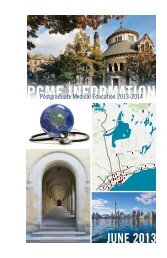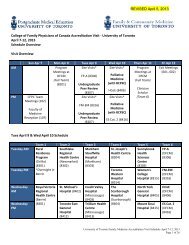Postgraduate Medical Education Information Booklet 2012-2013
Postgraduate Medical Education Information Booklet 2012-2013
Postgraduate Medical Education Information Booklet 2012-2013
Create successful ePaper yourself
Turn your PDF publications into a flip-book with our unique Google optimized e-Paper software.
University of Toronto Faculty of Medicine PGME <strong>2012</strong>-<strong>2013</strong><br />
Professional Responsibilities in<br />
<strong>Postgraduate</strong> <strong>Medical</strong> <strong>Education</strong><br />
INTRODUCTION<br />
The delivery of postgraduate medical education in Ontario has<br />
significantly evolved over time. Today training occurs in a variety of<br />
environments – teaching sites are not limited to traditional teaching<br />
hospitals, but also extend to community settings, such as physicians’<br />
private practices. Also, training relies on a team-based approach to care,<br />
involving the provision of comprehensive health services to patients by<br />
multiple health-care professionals. There are no longer exclusive<br />
domains of practice; rather, care is delivered through multidisciplinary<br />
teams. This collaborative, team based approach promotes optimal health<br />
care for patients.<br />
In order to ensure both an appropriate educational experience for<br />
trainees and a safe and effective delivery of health care to patients, it is<br />
essential that supervisors and trainees in the postgraduate environment<br />
are aware of the responsibilities and expectations that their roles entail.<br />
Trainees need to be given opportunities to observe and actively<br />
participate in clinical interactions in order to acquire the knowledge,<br />
skills, and judgment required for future practice. This occurs through a<br />
process of graduated responsibility, whereby trainees are expected to<br />
take on increased responsibility as they acquire greater competence. For<br />
this to occur safely, supervisors must be capable of assessing the<br />
competencies of the trainees they are supervising on an ongoing basis.<br />
Trainees cultivate attitudes about professionalism through observing the<br />
attitudes and behaviors displayed by their supervisors. Positive rolemodeling<br />
is therefore of the utmost importance and supervisors are<br />
expected not only to demonstrate a model of compassionate and ethical<br />
care, but also to interact with colleagues, patients, trainees, and other<br />
support staff in a professional manner.<br />
An understanding of the responsibilities and expectations placed on<br />
supervisors and trainees is essential for ensuring patient safety in this<br />
complex environment. Thus, while this policy focuses on professional<br />
responsibilities in the postgraduate environment, supervisors and<br />
trainees are expected to be familiar with other applicable CPSO policies<br />
as well; these include, but are not limited to Delegation of Controlled<br />
Acts, Mandatory Reporting, Consent to <strong>Medical</strong> Treatment, Disclosure of<br />
Harm, <strong>Medical</strong> Records, and Physician Behavior in the Professional<br />
Environment.<br />
92


